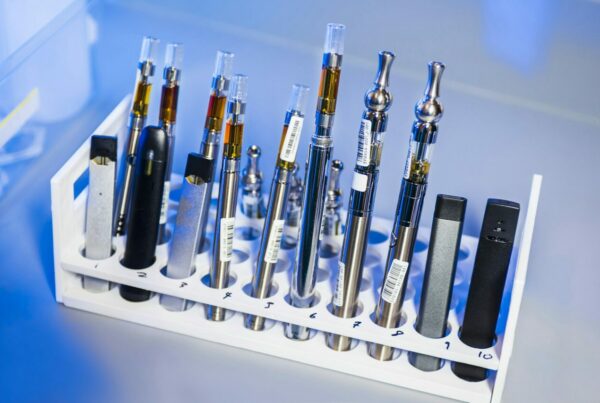N, N-Dimethyltryptamine (DMT) is a compound commonly found in both plants and animals, known for inducing intense yet fleeting psychedelic effects upon ingestion.
Emerging evidence suggests that DMT, which naturally exists within the body, plays crucial roles in both the peripheral and central nervous systems, possibly functioning as a neurotransmitter.
DMT can trigger strong psychedelic responses, but it typically doesn’t cause many negative side effects, apart from potential cardiovascular problems when administered in high doses through injections.
Let’s explore DMT and its diverse functions. These roles range from recreational usage to its promising potential in scientific studies and therapeutic applications.

A Brief Introduction to DMT: What is it?
| Aspect | Details |
| Name | N, N-Dimethyltryptamine (DMT) |
| Classification | Indole alkaloid |
| Occurrence | Naturally occurring in various plants and animals |
| Psychoactive Effects | Intense, yet short-lived psychedelic experiences upon consumption. |
| Method of Consumption | Can be smoked, injected, or consumed orally. |
| Duration of Effects | Brief duration, typically between 5 to 30 minutes. |
| Chemical Structure | Comprises a tryptamine core with two methyl groups attached to the amine nitrogen atom. |
| Metabolism | Rapidly metabolized by the body, degraded by monoamine oxidase (MAO). |
| Cultural Use | Historically used in various ceremonial and shamanic rituals by indigenous cultures. |
| Other names | Dimitri, Fantasia, Businessman’s trip, Businessman’s special, 45-minute psychosis, Spiritual molecule |
The Role of DMT in Mental Health
N, N-Dimethyltryptamine (DMT), a compound famous for its strong psychedelic effects, is garnering attention for its potential benefits to mental health. Despite its traditional image as a trigger for intense visionary experiences, recent research points to a correlation between DMT and mental wellness.
Influence on Psychological and Emotional Well-being
DMT’s psychedelic effects are renowned for eliciting profound emotional reactions and altering states of consciousness. These effects could potentially pave the way for new therapeutic approaches to mental health challenges, facilitating emotional processing, and offer new perspectives on personal traumas.
Neuroplasticity and Brain Function
Research suggests that DMT may influence neuroplasticity, thereby enhancing the brain’s ability to adapt and reorganize. Investigating its impact on synaptic plasticity and neural connectivity could lead to potential treatments for disorders associated with neural dysfunction.
Potential Therapeutic Applications for Mental Health Disorders
Initial studies underline DMT’s potential in treating conditions such as depression, addiction, and PTSD. Its ability to stimulate mystical or spiritual experiences could offer a novel approach to psychotherapy and aid in transforming negative thought patterns.
Exploring the natural presence of DMT within our bodies underscores its significance in mental health resilience, stress response, and overall psychological well-being. Understanding how the body regulates internal DMT levels may open up opportunities for new therapeutic strategies.
DMT and Mental Health Disorders
| Mental Health Disorder | Description | DMT’s Potential Effectiveness | Benefits |
| Depression | Defined as a mood disorder characterized by persistent sadness, lack of interest, and decreased motivation | Preliminary studies suggest DMT might alleviate symptoms by eliciting deeply emotional experiences. | Its rapid onset and ability to stimulate transformative experiences may provide innovative therapeutic methods for reshaping negative thought patterns and enhancing emotional processing |
| Post-Traumatic Stress Disorder (PTSD) | A mental health disorder triggered by traumatic events, leading to flashbacks, severe anxiety, and intrusive thoughts | Early findings point to DMT’s potential in managing symptoms by inducing spiritual or mystical experiences that could help patients reshape traumatic memories | DMT’s potential to induce altered states of consciousness could facilitate emotional processing and offer a fresh perspective on traumatic experiences |
| Addiction | A complex disorder characterized by compulsive engagement in rewarding stimuli despite adverse consequences | Some research proposes DMT’s role in interrupting addictive patterns and lessening cravings for substances | DMT’s capacity to provoke intense and transformative experiences might assist individuals in modifying their behavioural patterns and addressing addictive habits |
Approach to Utilizing DMT
DMT, renowned for its short yet potent psychedelic experiences, can be administered in a variety of ways. The choice of method often depends on the desired intensity and length of the experience.
Inhalation:
DMT, when inhaled using a pipe or vaporizer, necessitates careful temperature control to avoid overheating and burning the compound. The psychedelic effects are almost instantaneous when DMT is inhaled, usually lasting between 5 to 15 minutes.
Oral Consumption:
Taking DMT orally leads to slower onset effects that last significantly longer, often for several hours. This is due to the slower metabolism of DMT when combined with an MAOI.
Intravenous Injection:
DMT can be directly injected into the bloodstream for fast and intense effects.
This method results in an immediate and powerful experience, but it requires precise dosage and carries greater risks.
Insufflation (Sniffing):
Sniffing DMT results in a slower onset of effects compared to inhalation but may provide a more prolonged experience.
Sublingual or Buccal Administration:
When absorbed through the oral mucosa, this method offers an alternative to inhalation and provides a longer, though less intense, experience.
Determining Therapeutic Dosage: N, N-Dimethyltryptamine (DMT)
For inhalation, the suggested dosage is between 20 to 40 mg, while for intravenous administration, the recommended dosage is 0.2 to 0.4 mg per kg of body weight. These dosage guidelines are primarily applicable to clinical research and are particularly relevant for intravenous administration.
- Higher doses administered intravenously are associated with intense visuals, temporary loss of control, and a combined state of anxiety and euphoria
- Interestingly, lower doses have exhibited less favorable effects
- Recreational doses of inhaled DMT typically range from 40 to 50 mg, sometimes even reaching up to 100 mg
- Various doses of intravenous People who have experienced near-death experiences with DMT (7, 14, 18, and 20 mg solutions) have reported significant and long-lasting enhancements in their psychological well-being
Availability of DMT
ProductsOsmosis – 4-ACO-DMT Ethereal Essence Tincture
This tincture is marketed as containing 4-Acetoxy-N, N-dimethyltryptamine (4-AcO-DMT), a version of DMT. Tinctures are liquid extracts designed for oral intake, and this specific product might offer a distinctive experience compared to traditional DMT.
Lucid Supply Co. – 5-MeO DMT Vaporizer
This product is a vaporizer that delivers 5-Methoxy-N, N-dimethyltryptamine (5-MeO-DMT). The active ingredient, 5-MeO-DMT, is renowned for its powerful, transformative, and typically fleeting experiences.
Integral Alchemist – Acacia – 1ml DMT Vape Cartridge
The DMT vape cartridge from Integral Alchemist comes pre-loaded with N, N-Dimethyltryptamine. This product is likely aimed at those who favor a discreet and convenient method of DMT consumption.
Deadhead Chemist – 5-Meo-DMT Cartridge
This cartridge houses 5-Methoxy-N, N-dimethyltryptamine (5-MeO-DMT), a substance known for its deep and intense effects.
Projected mental health benefits may be associated with personal growth, spiritual experiences, or therapeutic applications targeted at improving emotional health.
Deadhead Chemist – N, N DMT Cartridge
Another offering from Deadhead Chemist, this cartridge carries the traditional N, N-Dimethyltryptamine. Cartridges provide a user-friendly mode of DMT administration, ensuring a more consistent and controlled experience.
Concluding Remarks
The administration of N, N-Dimethyltryptamine (DMT) in
How can one source DMT products in a responsible manner?
Reliable sources like Strongest Cubensis Strain Canada Online Dispensary provide a variety of DMT products and offer guidance for those interested in exploring these products responsibly.
The journey through mental health therapy is exciting but complex. The compound’s ability to incite brief, yet intense, psychedelic experiences opens the door for innovative therapeutic approaches.
Preliminary research indicates potential benefits in emotional processing and personal growth, amongst others. Such profound effects of mental health therapy necessitate careful consideration and responsible use.
Frequently Asked Questions:
How do different DMT products affect mental health?
For instance, vaporizers may yield quick results, whereas tinctures or vape cartridges might offer controllable and consistent doses.
Including derivative compounds or 5-MeO-DMT may result in varying intensities and distinct mental health effects.
These slight differences underline the importance of choosing a DMT product based on individual needs and mental health goals.
Can DMT lead to enduring changes in mental health and personal growth?
There are anecdotal accounts suggesting that DMT-induced experiences could have long-term effects on mental health and personal development.
Experiences that are deeply transformative or akin to near-death experiences are often associated with reports of sustained positive changes in psychological health and personal development.
Though these experiences are intense and brief, they frequently lead to introspection, spiritual revelations, and a sense of unity or enlightenment.
Many report a refreshed perspective on life, improved emotional resilience, and a heightened appreciation for life post these experiences.
What’s the most effective strategy for using DMT for mental health?
It’s crucial to make informed decisions that include thorough research and understanding of the compound’s effects.
Advice from mental health professionals or experienced users can provide valuable insights into potential risks and advantages.
Understanding personal tolerance and mental preparedness is also vital, as well as creating a supportive and safe environment for the experience.
How does DMT stack up against other psychedelic therapies such as psilocybin or LSD in mental health treatment?
DMT’s effects, duration, and intensity set it apart from other psychedelics like psilocybin or LSD. Its shorter duration
The unique experiences created by intense, short-acting psychedelics require specialized therapeutic strategies in mental health, separate from the tactics employed for longer-lasting psychedelics.
Recommended Further Reading:





